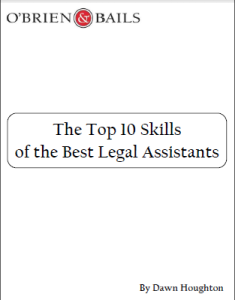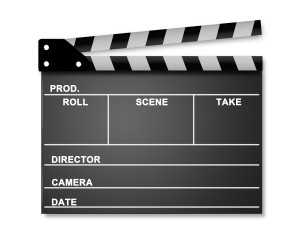 Legal assistants are a necessary, important part of any law practice. The best legal assistants provide integral support for attorneys and clients. An assistant with exceptional skills is a valuable asset to a legal office.
Legal assistants are a necessary, important part of any law practice. The best legal assistants provide integral support for attorneys and clients. An assistant with exceptional skills is a valuable asset to a legal office.
We just released a new report, The Top 10 Skills of the Best Legal Assistants, and wanted to go ahead and discuss 3 of the 10 skills in this article.
When looking for a legal assistant, here are 3 of the top skills you will want to look for in your interviewing process:
- Organizational Skills – With all the details that need to be handled in a case, attorneys often need help with organization. Organizational skills are essential to efficiently manage a law practice or corporate legal department. The best legal assistants are able to maintain paper and electronic files, manage projects, track multiple deadlines, maintain calendars, schedule meetings, organize events and keep everything orderly and accessible.
- Technology Skills – Many attorneys do not have the time to become expert at operating legal office technology. They rely on tech-smart legal assistants to perform a variety of computer-based tasks such as: creating spreadsheets, preparing presentations, entering time for billing purposes, creating and typing documents, maintaining calendars and tracking deadlines. Therefore, the best legal assistants are proficient in a variety of computer software applications. Some of the most common technologies that the best legal assistants have mastered include:
- Word processing
- Spreadsheet
- Presentation
- Document Management
- Time & Billing
- Calendar & Docketing
- Transcription
- Desktop Publishing
- Videoconferencing
- Relationship and People Skills – Legal assistants interact daily with attorneys, paralegals, staff, clients, opposing counsel, judicial personnel, vendors and other third parties. Therefore, superior interpersonal and communication skills are essential. In addition to face-to-face contact, assistants communicate by e-mail, telephone and videoconferencing systems.
The best legal assistants are a key resource for any practicing attorney. The best legal assistants get more work done at less cost. An experienced legal assistant can anticipate the needs of a lawyer in many instances and take care of what needs to get done, freeing up the attorney to focus his energy and time on work that is best performed by the attorney.
This is an excerpt from one of our reports. If you would like to read about the other 7 of the top 10 skills of the best legal assistants, download the report here: The Top 10 Skills of the Best Legal Assistants.
 Streaming Realtime transcription is the term for transcription by court reporters to deliver computer text of speech over the Internet within seconds of the words being spoken. Realtime can also mean transmitting audio and video of the proceedings. Users can see the text and video from any computer with Internet access as the witness answers questions. Streaming realtime can be viewed from any computer, whether in the same room as the proceedings or viewed remotely from another location.
Streaming Realtime transcription is the term for transcription by court reporters to deliver computer text of speech over the Internet within seconds of the words being spoken. Realtime can also mean transmitting audio and video of the proceedings. Users can see the text and video from any computer with Internet access as the witness answers questions. Streaming realtime can be viewed from any computer, whether in the same room as the proceedings or viewed remotely from another location. As court reporters, we are very critical of courtroom scenes in movies. Often, they are unrealistic and contain inaccurate procedures. Since we see a lot of testimony, courtroom scenes in movies often do not live up to the real thing.
As court reporters, we are very critical of courtroom scenes in movies. Often, they are unrealistic and contain inaccurate procedures. Since we see a lot of testimony, courtroom scenes in movies often do not live up to the real thing. How long have you been a court reporter?
How long have you been a court reporter? Over recent months, the legal industry has been quickly adopting iPads and discovering ways to use legal technology to enhance productivity. Because the iPad is so small and portable, the technology affords us yet another convenient way to take our documents and files with us when we leave the office. With the addition of the right iPad apps, we can do almost the same work on our tablets as we do on our desktop computers.
Over recent months, the legal industry has been quickly adopting iPads and discovering ways to use legal technology to enhance productivity. Because the iPad is so small and portable, the technology affords us yet another convenient way to take our documents and files with us when we leave the office. With the addition of the right iPad apps, we can do almost the same work on our tablets as we do on our desktop computers.